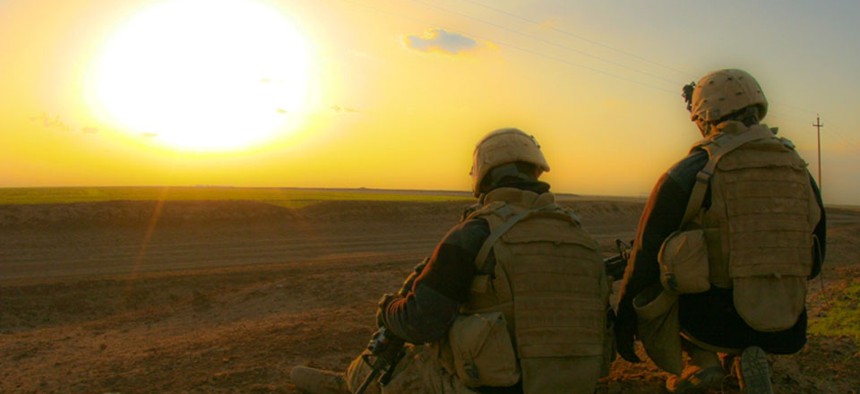Troops With Traumatic Brain Injury Show Symptoms 5 Years Later

Defense Department file photo
Long-term TBI study mandated by Congress has been unfunded since 2006.
A high proportion of the 273,859 troops diagnosed with traumatic brain injury since the start of the wars in Afghanistan and Iraq continued to experience “significant symptoms and problems” five years after injury, the Pentagon said in its first take on a 15-year TBI study mandated by Congress.
The long-term study into those wars’ signature wound -- which results from blasts from improvised bombs and mines -- has received no funding, is based on a skewed cohort limited to active duty personnel and had a woefully slow start.
Congress required the Defense Department to conduct the 15-year longitudinal study in the 2007 National Defense Authorization Act ( section 721 ), signed into law in 2006. The study did not get underway until 2011, after a review by a Defense panel that oversees medical research, Jessica Wright , acting undersecretary of Defense for personnel and readiness, wrote in her cover letter to the first of four reports mandated for the third, seventh, eleventh and 15 th year of the study.
Defense has been frustrated by Congress’ failure to fund the study, the report said. The Defense and Veterans Brain Injury Center, charged with conducting the study, has not received any money allocated specifically for the project, the “vast majority” of which has so far been covered by the DVBIC operational budget.

Broken Warriors
is an ongoing series on mental health issues in the military.
The 15-year TBI study will cost a total of $37.1 million, the report estimated. DVBIC is “actively pursuing” external funding sources, including the Veterans Affairs Department, but “there is no identified funding mechanism at present.” The Military Health System spent roughly half that sum, $18 million, from 2009 through June 2012, developing a flawed TBI diagnosis tool that was canceled.
The report sharply criticized Congress for limiting the 1,000 personnel enrolled in the study to active duty personnel. That restriction was the result of Pentagon requirements limiting medical research to troops in the Defense Enrollment Eligibility Reporting System, or DEERS, which qualifies them for treatment in military hospitals or under TRICARE insurance during the course of the study.
Limiting the study to DEERS-eligible active duty personnel “is a serious impediment [which]….will diminish the scientific integrity of the studies and result in the enrollment of a non-representative sample that will significantly limit the data’s generalizability and utility,” the report said.
Dr. Remington Nevin, a former Army epidemiologist who left the service last fall to pursue a degree at the Johns Hopkins Bloomberg School of Public Health in Baltimore, said limiting the study to active-duty personnel will “destroy not diminish” the scientific integrity of the research.
Restricting the study to subjects remaining on active duty at the end of 15 years will mean a focus on “those who sustained only minimal TBI,” he said. “The long-term findings from this study will be heavily biased toward the young and the healthy and will be essentially meaningless in informing the future care of those battling serious injury.”
Nevin said the first report to Congress offered little insight into TBI in terms of new findings and “highlights the pitfalls of well-intentioned non-scientists legislating research study design from the Hill.” He said Congress should back establishment of an independent cross-agency military and veterans’ public health center capable of proactively performing the critical studies needed to better inform care for the next generation of injured warriors.
Dr. Chrisianne Gordon, chairwoman of Resurrecting Lives , a TBI research, treatment and advocacy group based in Columbus, Ohio, took exception to the Pentagon’s long-favored term “mild TBI,” saying it ignores that many troops may have sustained multiple blast injuries that could translate into exponential brain damage.
She also objected to the report’s use of the term post-concussion syndrome, which views impairment of cognitive functioning as a mental issue rather than as physical damage to the brain due to bomb blasts.
The report says study researchers will use multiple types of scanning systems to determine physical brain damage, including magnetic resonance imaging and the newer diffusion tensor imaging, which offers a glimpse into brain microstructure at a scale that is not easily accessible with other technologies. Resurrecting Lives has backed this approach with research funding.
Gordon had a hard time comprehending why Congress failed to provide funds for the 15-year study. Caring for troops diagnosed with TBI should not have a price limit, she said.






